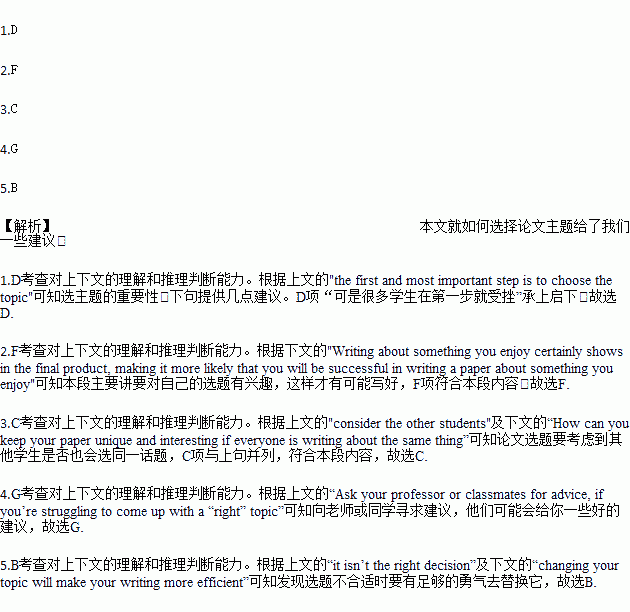题目内容
How to Choose a Topic for Your Paper
No matter what research paper you write, the first and most important step is to choose the topic. 1. Here are some tips for you to follow.
To choose a good topic, you’ll have to ask yourself some important questions. Is there enough research available on this topic? Is the topic new and unique enough that I can offer fresh opinions? Is it related to my subject and future occupation?
2. Writing about something you enjoy certainly shows in the final product, making it more likely that you will be successful in writing a paper about something you enjoy.
If you are writing a research paper for a class, consider the other students. 3. How can you keep your paper unique and interesting if everyone is writing about the same thing?
Ask your professor or classmates for advice, if you’re struggling to come up with a “right” topic. 4. Sometimes asking professors for help may seem frightening, but if they are worth anything as a professor,they want you to be successful in your work,and will do what they can to make that happen.
If you choose a topic, begin researching,and realize that it isn’t the right decision for you for some reason, don’t worry! 5. Although it requires a bit more time, yet changing your topic will make your writing more efficient.
A. Have a clear picture of organization in mind.
B. Be courageous and change it.
C. Is it likely that they will also be writing about your topic?
D. However, many students are discouraged by this first step.
E. Take a trip to your local library or university library.
F. Choose a topic that you have very strong emotion in.
G. They are likely to have great ideas.


 rk hard.”
rk hard.” when. “We’ve learned that what really affects people is their sense of how they’re doing compared with other people in their peer group, or with where they thought they would be at a certain point in life, says Brian Kropp, who heads CEB’s HR practice. “We’ve learned to focus on moments that allow people to make these comparisons.”
when. “We’ve learned that what really affects people is their sense of how they’re doing compared with other people in their peer group, or with where they thought they would be at a certain point in life, says Brian Kropp, who heads CEB’s HR practice. “We’ve learned to focus on moments that allow people to make these comparisons.”